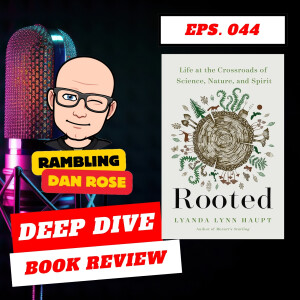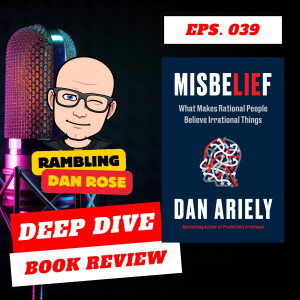Rambling Dan Rose Deep Dive Book Reviews
Dive into the world of insights and ideas with Rambling Dan Rose Deep Dive Book Reviews! We explore a wide range of topics through thoughtful, in-depth book reviews, offering inspiration, learning, and engaging conversations. Whether you’re here to expand your perspective or enjoy meaningful discussions, our content is crafted to inform and entertain. Join us as we unpack valuable insights on today’s most compelling subjects. Don’t forget to like and subscribe for updates on new content—thanks for stopping by!
Episodes

Thursday Dec 05, 2024
Thursday Dec 05, 2024
Today's Deep Dive book review focuses on the concept of mental models, which are blueprints for thinking about situations and making decisions. The book, Mental Models by Peter Hollins, draws from the work of Charlie Munger and Warren Buffet, and explores various mental models like Occam's Razor, Hanlon's Razor, and the Pareto Principle. He emphasizes the importance of building a latticework of mental models to navigate the world more effectively, make better decisions, and solve problems more efficiently. The excerpt also touches upon how to avoid common pitfalls in thinking, such as being fooled by correlations, confusing urgent tasks with important ones, and falling into the trap of analyzing trivial details.
We use AI to help create our podcast episodes, generating voices and initial scripts. We carefully craft each episode through specific prompting and editing to ensure it offers helpful, accurate insights based on books we've read or books recommended by our listeners. AI allows us to produce consistent, high-quality content more efficiently and frequently so we can focus on delivering valuable discussions to you.
We recognize that everyone will hold their own opinions about the books, authors, and topics we explore in our reviews. Our goal is to provide diverse opinions and viewpoints that contribute to a critical study of the issues being discussed.
Have a book you'd like us to review in our unique podcast style? Drop us a comment, and we’ll check it out!

Thursday Dec 05, 2024
Thursday Dec 05, 2024
Today's book review podcast is of Angela Duckworth's book, Grit: The Power of Passion and Perseverance, where she argues that grit, a combination of passion and perseverance, is a more important predictor of success than innate talent. Duckworth draws on research conducted in various fields, including military training, education, business, and athletics, to support her argument. She demonstrates that individuals who are gritty tend to persevere through challenging situations, stay committed to their goals over time, and achieve more, even if they may not be the most naturally talented. Duckworth emphasizes that while talent plays a role in achievement, it is effort that truly counts, and a combination of talent and consistent effort leads to skill and achievement.
We use AI to help create our podcast episodes, generating voices and initial scripts. We carefully craft each episode through specific prompting and editing to ensure it offers helpful, accurate insights based on books we've read or books recommended by our listeners. AI allows us to produce consistent, high-quality content more efficiently and frequently so we can focus on delivering valuable discussions to you.
We recognize that everyone will hold their own opinions about the books, authors, and topics we explore in our reviews. Our goal is to provide diverse opinions and viewpoints that contribute to a critical study of the issues being discussed.
Have a book you'd like us to review in our unique podcast style? Drop us a comment, and we’ll check it out!

Thursday Dec 05, 2024
Thursday Dec 05, 2024
Today we look at John Grisham's and Jim McCloskey's "Framed: Astonishing True Stories of Wrongful Convictions," a book that explores real-life cases of wrongful convictions. The book focuses on several cases of injustice, including that of the "Norfolk Four," a group of U.S. Navy sailors who were wrongly convicted of rape and murder in Norfolk, Virginia. The book highlights how the police and prosecutors manipulated evidence and coerced false confessions from innocent men to achieve a conviction, ignoring clear evidence that pointed to the real killer, Omar Ballard. Also examined is a story of the wrongful conviction of Clarence Brandley, a Black man who was sentenced to death in Conroe, Texas for the rape and murder of a young white girl. The book details how Brandley’s conviction was based on false testimony, a predetermined investigation, and systematic racism within the Conroe judicial system, ultimately showcasing the systemic flaws within the American justice system.
We use AI to help create our podcast episodes, generating voices and initial scripts. We carefully craft each episode through specific prompting and editing to ensure it offers helpful, accurate insights based on books we've read or books recommended by our listeners. AI allows us to produce consistent, high-quality content more efficiently and frequently so we can focus on delivering valuable discussions to you.
We recognize that everyone will hold their own opinions about the books, authors, and topics we explore in our reviews. Our goal is to provide diverse opinions and viewpoints that contribute to a critical study of the issues being discussed.
Have a book you'd like us to review in our unique podcast style? Drop us a comment, and we’ll check it out!

Thursday Dec 05, 2024
Thursday Dec 05, 2024
Today we review Ta-Nehisi Coates's book, "The Message." Coates book explores the legacy of race and racism through his personal experiences traveling to Senegal, South Carolina, and Palestine. He reflects on the historical and cultural implications of slavery, colonization, and the ongoing struggles for equality in America and abroad. The book also focuses on the writer's experiences growing up as a Black boy in America and attending Howard University. He discusses the importance of education, the need for "safe spaces" in confronting racialized ideas, and the impact of colonialism and white supremacy on both Black Americans and Palestinians. Both sources center on the need for a clearer understanding of the past to better understand the present, and ultimately, to shape a more just future.
We use AI to help create our podcast episodes, generating voices and initial scripts. We carefully craft each episode through specific prompting and editing to ensure it offers helpful, accurate insights based on books we've read or books recommended by our listeners. AI allows us to produce consistent, high-quality content more efficiently and frequently so we can focus on delivering valuable discussions to you.
We recognize that everyone will hold their own opinions about the books, authors, and topics we explore in our reviews. Our goal is to provide diverse opinions and viewpoints that contribute to a critical study of the issues being discussed.
Have a book you'd like us to review in our unique podcast style? Drop us a comment, and we’ll check it out!

Thursday Dec 05, 2024
Thursday Dec 05, 2024
Our review today is from a series of excerpts from the memoir of Russian opposition leader Alexei Navalny. The memoir, entitled "Patriot: A Memoir," describes Navalny's experiences as a political activist in Russia, including his opposition to Vladimir Putin, his poisoning by the Russian government, and his imprisonment. The text offers a poignant and personal account of Navalny's struggles against the Russian regime. The memoir also explores his experiences in prison, where he faced constant harassment, torture, and threats.
We use AI to help create our podcast episodes, generating voices and initial scripts. We carefully craft each episode through specific prompting and editing to ensure it offers helpful, accurate insights based on books we've read or books recommended by our listeners. AI allows us to produce consistent, high-quality content more efficiently and frequently so we can focus on delivering valuable discussions to you.
We recognize that everyone will hold their own opinions about the books, authors, and topics we explore in our reviews. Our goal is to provide diverse opinions and viewpoints that contribute to a critical study of the issues being discussed.
Have a book you'd like us to review in our unique podcast style? Drop us a comment, and we’ll check it out!

Thursday Dec 05, 2024
Thursday Dec 05, 2024
Today's podcast comes from the book "Rooted Life at the Crossroads of Science, Nature, and Spirit" by Lyanda Lynn Haupt. Haupt explores the importance of cultivating a connection with the natural world through personal experiences and a variety of scientific and philosophical perspectives. She argues that fostering a deep, embodied relationship with nature requires embracing solitude, engaging with a variety of spiritual traditions, and actively resisting the modern tendency to objectify and exploit the natural world. The author encourages readers to develop a rootedness in the earth, incorporating practices such as barefoot walking, contemplative walking, and listening to the voices of nature.
We use AI to help create our podcast episodes, generating voices and initial scripts. We carefully craft each episode through specific prompting and editing to ensure it offers helpful, accurate insights based on books we've read or books recommended by our listeners. AI allows us to produce consistent, high-quality content more efficiently and frequently so we can focus on delivering valuable discussions to you.
We recognize that everyone will hold their own opinions about the books, authors, and topics we explore in our reviews. Our goal is to provide diverse opinions and viewpoints that contribute to a critical study of the issues being discussed.
Have a book you'd like us to review in our unique podcast style? Drop us a comment, and we’ll check it out!

Thursday Dec 05, 2024
Thursday Dec 05, 2024
Bob Woodward's Fear examines the first year of the Trump presidency through extensive interviews with White House staffers, administration officials, and other sources. The book focuses on the inner workings of the White House, providing detailed accounts of critical events and decisions. Woodward explores the president's interactions with key players, including his advisors, cabinet members, and military leaders, highlighting the conflicts, disagreements, and occasional cooperation that shaped the administration's policies on trade, immigration, national security, and other issues.
We use AI to help create our podcast episodes, generating voices and initial scripts. We carefully craft each episode through specific prompting and editing to ensure it offers helpful, accurate insights based on books we've read or books recommended by our listeners. AI allows us to produce consistent, high-quality content more efficiently and frequently so we can focus on delivering valuable discussions to you.
We recognize that everyone will hold their own opinions about the books, authors, and topics we explore in our reviews. Our goal is to provide diverse opinions and viewpoints that contribute to a critical study of the issues being discussed.
Have a book you'd like us to review in our unique podcast style? Drop us a comment, and we’ll check it out!

Thursday Dec 05, 2024
Thursday Dec 05, 2024
Our podcast today is a review of Bob Woodward's book Rage, in which he details conversations and events leading up to and during President Trump's term in office. The source highlights Trump's actions and reactions to major crises such as the COVID-19 pandemic and the protests following the death of George Floyd. Woodward examines Trump's interactions with key figures like his advisors, military leaders, and other heads of state, and provides insights into Trump's decision-making processes and personal beliefs. The text also emphasizes the importance of accurate information and clear communication during crises, especially when dealing with complex situations like the COVID-19 pandemic.
We use AI to help create our podcast episodes, generating voices and initial scripts. We carefully craft each episode through specific prompting and editing to ensure it offers helpful, accurate insights based on books we've read or books recommended by our listeners. AI allows us to produce consistent, high-quality content more efficiently and frequently so we can focus on delivering valuable discussions to you.
We recognize that everyone will hold their own opinions about the books, authors, and topics we explore in our reviews. Our goal is to provide diverse opinions and viewpoints that contribute to a critical study of the issues being discussed.
Have a book you'd like us to review in our unique podcast style? Drop us a comment, and we’ll check it out!

Thursday Dec 05, 2024
Thursday Dec 05, 2024
Today's book review looks at Bob Woodward and Robert Costa’s book, Peril, which focuses on the political events surrounding the 2020 presidential election and the transfer of power to President Joe Biden. The authors examine the tumultuous relationship between President Donald Trump and his administration, particularly with the top military leaders, along with Trump’s attempts to overturn the election results. They also explore the Biden team’s efforts to respond to the COVID-19 pandemic and navigate the challenges of governing during a deeply divided political climate.
We use AI to help create our podcast episodes, generating voices and initial scripts. We carefully craft each episode through specific prompting and editing to ensure it offers helpful, accurate insights based on books we've read or books recommended by our listeners. AI allows us to produce consistent, high-quality content more efficiently and frequently so we can focus on delivering valuable discussions to you.
We recognize that everyone will hold their own opinions about the books, authors, and topics we explore in our reviews. Our goal is to provide diverse opinions and viewpoints that contribute to a critical study of the issues being discussed.
Have a book you'd like us to review in our unique podcast style? Drop us a comment, and we’ll check it out!

Thursday Dec 05, 2024
Thursday Dec 05, 2024
Today's review, "Misbelief" by Dan Ariely, explores the phenomenon of why people believe irrational things, particularly during the COVID-19 pandemic. The book uses Ariely's own experience of being targeted by conspiracy theorists as a springboard to examine the psychological and social factors that contribute to misbelief. Ariely delves into the emotional conditions that lead individuals to adopt false narratives, such as stress, lack of control, and the need for explanations. He also explores cognitive biases, including biased search, illusory truth effect, and hindsight bias, which can contribute to the formation and reinforcement of misbeliefs. Additionally, the book examines the role of social groups in accelerating misbelief, highlighting the influence of social conformity, ostracism, and cognitive dissonance. Ariely ultimately argues that addressing misbelief requires understanding the psychology behind it and finding ways to build trust, counter misinformation, and promote critical thinking.
We use AI to help create our podcast episodes, generating voices and initial scripts. We carefully craft each episode through specific prompting and editing to ensure it offers helpful, accurate insights based on books we've read or books recommended by our listeners. AI allows us to produce consistent, high-quality content more efficiently and frequently so we can focus on delivering valuable discussions to you.
We recognize that everyone will hold their own opinions about the books, authors, and topics we explore in our reviews. Our goal is to provide diverse opinions and viewpoints that contribute to a critical study of the issues being discussed.
Have a book you'd like us to review in our unique podcast style? Drop us a comment, and we’ll check it out!






